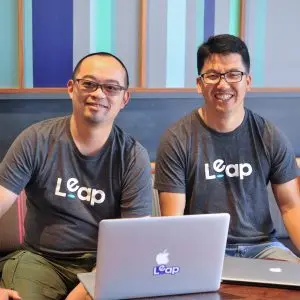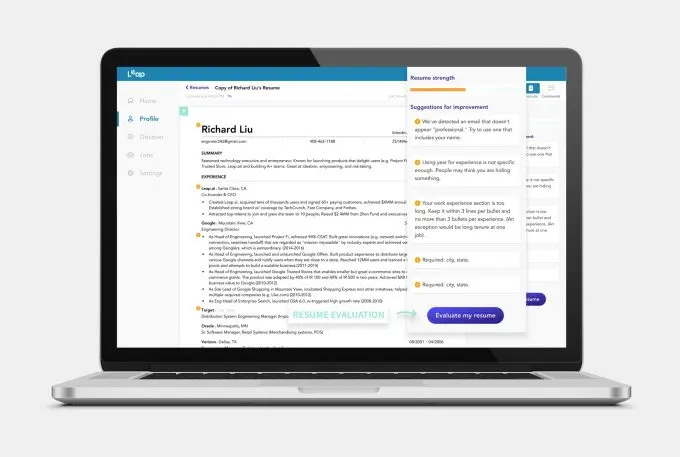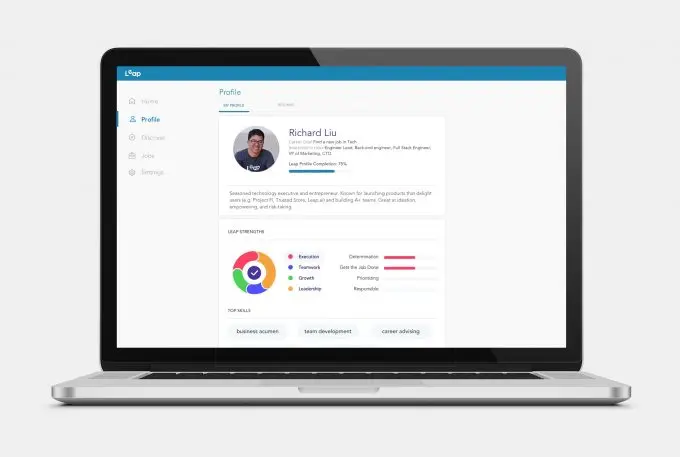“Resumes suck,” declares Richard Liu, cofounder and CEO of Leap.ai. So Liu, Google’s former head of engineering at Project Fi, set out to fix it with fellow Google vet Yunkai Zhou.
Your resume is essential to your job hunt, but recruiters and hiring managers spend as little as six seconds scanning it to decide if you’ll get an interview.

Liu says that part of the problem lies in the job search itself. The resume is a vehicle for a job seeker who’s actively scanning multiple openings and is usually tailoring their resume to suit whatever the job description requires. With the help of AI, he contends, it’s possible to create both a more intelligent resume for recruiters to use and more intelligent job search for the applicant.
Related: A Former Google Recruiter Reveals The Biggest Resume Mistakes
For the job seeker, Liu believes that instead of searching through tons of jobs, it’s better to deeply understand your values and preferences. And informed by his time at Google where he was responsible for overseeing the hiring of some 500 people, Liu says it’s not enough for hiring managers to look at education and past experience. “How do you view a team and look beyond the surface to identify the skills of who can be a star performer,” he explains.
The first step with Leap.ai is helping the job seeker improve their resume.The candidate must do a self-assessment that focuses on sussing out their strengths (i.e., collaboration, leadership), skills (UX design, sales, marketing), and personal values, as well as what preferences they have for a job (working in teams, independent, remote). Uploading a resume will trigger the tool that helps make it better. Highlighted boxes with tips can suggest trimming sections or rounding others out, and an assessment pops up at the end to indicate where other improvements can be made. Liu estimates there are about 100 tips baked into the platform to help job seekers boost their chances of getting an interview.

This isn’t the first company to build an AI solution to play matchmaker between job seekers and hiring managers. TalentWorks, the hybrid AI-human platform, has been guaranteeing job seekers will land an interview in six weeks (for $70) since 2015. Part of the way it works is through resume optimization. Jobbio touts the efficacy of its “live Bio” feature that is supposed to better at showcasing talent and experience than a static resume because it can be updated more frequently. Jobbio currently claims that 4,200 companies are hiring through the platform, including HubSpot, TransferWise, Airbnb, and Etsy. And then there’s Microsoft, which just launched Resume Assistant th, a feature that works within its Office 365 environment, but taps LinkedIn data to help the job seeker articulate their skills and experience in a better way.
Resume editing [Animation: courtesy of Leap.ai]Since it launched in late August, Leap.AI has had a 70% success rate of matching candidates with a company for an interview. Liu did not disclose user numbers, and it is too early to assess how many of them have been hired. However, he says that Leap.ai is already working with more than 70 partner companies, the majority of which are top technology firms like Dropbox, Zoom, MuleSoft, and Cloudera, along with international tech corporations like Baidu, Didi, and Meitu.
And it isn’t just for tech jobs, says Liu. Any job that has a connection to products including sales, marketing, and operations are in the mix (although the split is about 60/40 with the emphasis on tech). The only jobs they aren’t covering are accounting, finance, and HR.

Matching candidates with early-stage companies is a boon for both, he says. They may not have considered landing at such a place, but if it’s a value match, it’s a perfect opportunity. “They might be the next Google,” Liu muses.
Mostly, says Liu, he just wants Leap.ai to enable people’s career success and happiness on the job. Eventually, he says Leap.ai will use more human mentors to help those people who haven’t matched with any companies. “That person can sit with me and look at me compassion and understand my pain,” Liu explains “That cannot be replaced [by AI].”
But AI can solve a larger problem he’s witnessed firsthand at Google. While some people struggled within certain teams, once they moved, they thrived in a new role that was better suited to their strengths and values. “If everybody has that chance,” says Liu, “the world will become a much better place.”
Recognize your brand’s excellence by applying to this year’s Brands That Matter Awards before the early-rate deadline, May 3.